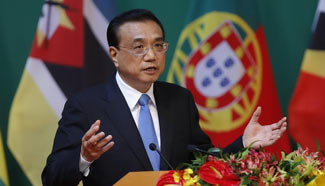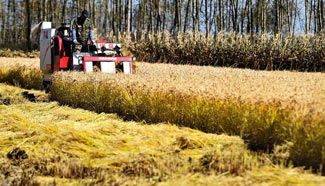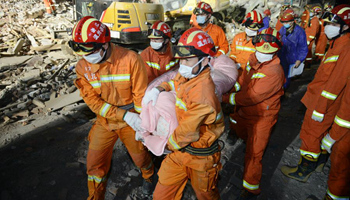by Chu Mengmeng
BEIJING, Oct. 11 (Xinhua) -- It is 7:30 p.m. and Ma Yue is practicing Brazilian jiu-jitsu with her teammate. Face to face, they attack each other with fists and feet, before becoming entwined, rapidly tackling each other to the ground and looking for an opportunity to lock and subdue their opponent.
In this training room in Wangjing, northeast Beijing, 20 fighters in pairs are spread around a 200 square meter mat. Though the room is air-conditioned, they are drenched in sweat.
"For the past three years, Brazilian jiu-jitsu has developed rapidly in China, especially in first-tier cities," said Ma, 23, who started learning jiu-jitsu a year ago. She is one of the few women to take part in professional competitions.
"In recent years, a lot of martial arts gyms have opened in China. Most provide various kinds of fighting courses, including Brazilian jiu-jitsu," she said.
"Everyone in Brazil loves playing jiu-jitsu, whether they are men or women," says Denilson Bischiliari, Ma's Brazilian coach. Bischiliari used to be a member of Atos, a world-renowned jiu-jitsu team, and came to China to teach jiu-jitsu a year ago.
"In Brazil, there are jiu-jitsu competitions every Sunday. If you want, you can just go to a jiu-jitsu gym and fight," Bischiliari said.
Bischiliari estimates that in his home city, San Paolo, there are more than 200 jiu-jitsu gyms.
On the fourth competition day of the Rio Olympics in August, Rafaela Silva, a Brazilian athlete, won a gold medal in judo in the women's 57 kg. It was the first gold for the host country at this year's Olympic Games and Brazil's 18th Olympic judo gold ever.
It is because of the popularity of jiu-jitsu in Brazil that Brazilian athletes are good at judo. Originating from Japanese judo and traditional jiu-jitsu, Brazilian jiu-jitsu has developed its own unique features since the beginning of the 20th century and is now one of the most important types of Mixed Martial Arts (MMA).
But now, Brazilian jiu-jitsu has traveled across the ocean and is booming in China.
"The influence of celebrities is one of the reasons jiu-jitsu has become so popular in China," Ma said.
Many models and actors play jiu-jitsu to keep fit, and this has introduced the sport to more people.
"Another reason is that many office workers in big cities, especially males, are under huge living pressure," Ma said. "Martial arts is an effective way for them to relax."
Ma has many teammates with decent jobs and good incomes. As Ma only graduated from Beijing City University in July, her elder teammates provide her with valuable advices about her life choices.
She believes that jiu-jitsu is fascinating enough to be the martial art of choice for many people and that it will continue to become more popular.
Brazilian jiu-jitsu is known for its ingenious techniques that allow a weak person to defeat a much stronger assailant.
"Of course, it still takes strength to play jiu-jitsu. But it's not direct violence," Ma said. "The players need to respond fast. We must rapidly decide how we are going to move our bodies and which position is more advantageous."
Often joking about ability, Ma says that she often finds herself "not intelligent enough" for the sport.
Bischiliari, Ma's coach, is 27 and has practiced jiu-jitsu for 10 years and won championships in many world competitions. Last July, Denilson heard from a friend that MMA was popular in China, and decided to come here to become a jiu-jitsu coach.
"There are not many black belts in China. But there are a lot of people who are interested in jiu-jitsu." Over the past year, he has already taught more than a hundred Chinese students -- Ma is one of them.
"Now, there are around 2,000 people practicing jiu-jitsu in China and 300 to 500 people in Beijing," says Wang Yanbo, an MMA commentator with a purple belt in jiu-jitsu. "Nevertheless, the rules for promoting jiu-jitsu are very strict, so black-belt coaches are rare in China."
Although there are more than a hundred gyms teaching jiu-jitsu in Beijing, only ten are able to provide training for professionals." In June, 2016, Zhang Tiequan, a martial artist, obtained the first jiu-jitsu black belt on the Chinese mainland. According to Bischiliari, there are only around 200 black belts in Brazil.
Although Ma has only practiced jiu-jitsu for one year, she has already participated in three international or national competitions, and won second place in the International Brazilian Jiu-jitsu Open in Bangkok, her personal best.
There are not many professional jiu-jitsu players in China, and Ma has not decided whether she will become a professional or not, but it seems that she might be practicing the martial art for quite some time. "One thing is for sure, I will never give up jiu-jitsu," she says.










